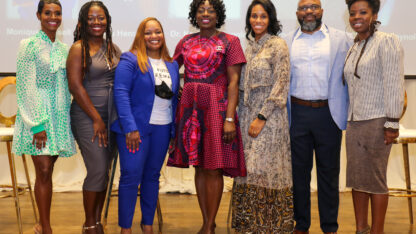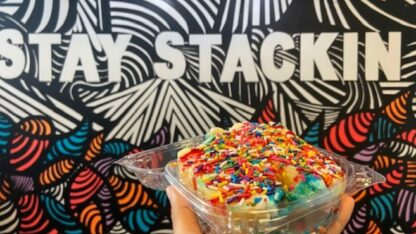On a recent Saturday evening, artist Justin Wilkins sits behind three long tables in the Atlantic Station retail district, watching the sunset with a paintbrush in hand. But Wilkins wasn’t just enjoying the view: he was presenting his work as part of Maker’s Market, an outdoor vendors market held at Atlantic Station’s outdoor venue space weekly on Saturday and Sunday evenings.
“This is our sixth year doing the market. It’s just grown steadily more or less over time,” Powell said. “It has really established itself as a haven for small businesses in Atlanta.”
Powell, who has been the executive director of Makers Market since its establishment in 2017, connects with local businesses through the market website and selects which ones will be featured.
“It’s a rotating community, so it’s an interesting dynamic,” said Powell. “We don’t use the same folks every week, although there are some regulars.”
The outdoor space and popularity of Atlantic Station provide vendors with exposure to diverse audiences and increased visibility that most of the participating businesses do not experience in the locations where they are based, many within residential areas outside of metro Atlanta.
For Richard Totimeh, vendor and operator of cold press juice company Juice Champs, the convenient location and a presence on social media have led to easier opportunities to draw out customers who may not visit his storefront business in Kennesaw.
“A lot of times, I will post that I will be out at Atlantic Station, and they will come out here,” he said.
“Unlike big businesses we usually don’t have the promotion and marketing or funding. Anything helps, especially if you’re a small business,” said Wilkins, who has participated in the market for the past four years.
“They are really living out their passion and their inspiration, and they bring that wonderful energy to the market.”
Aaron Powell, Market Curator – Makers Market
Much like Jones, the creation of designer Gregory Foreman’s clothing apparel business, Respect Due, started from an interaction with his own family.
“I had an 11-year-old son who didn’t recognize major artists like Prince and Michael Jackson,” he said. “I had to figure out another way to reach teaching him with history, especially Black history.”
His solution was to use a screen printer to create shirts featuring various artists, musicians and activists that he admired during his childhood.
“Investing into small businesses is investing into the future.”
Kyonna Gibson, Founder – Herbal Luxuries LLC
The success of the shirts in teaching his son encouraged Foreman to develop his own business from the idea. Serving customers with the promise to “celebrate and educate,” the company has launched 12 different categories of shirts giving tribute to legends ranging from author and poet Phyllis Wheatley to former NBA athlete Kareem Abdul-Jabbar.
“It was a little difficult to start, but once we got out there everybody loved it,” Foreman said. “Ain’t nobody gone teach these kids about who did it before and these icons but us.”
Participating vendors and Powell both noted that Marker’s Market has provided a welcoming home for marginalized business owners to be placed in the forefront, including Black-owned and women-led businesses.
Kyonna Gibson, founder of Herbal Luxuries LLC, a line of all natural Holistic skin care products, says that the inclusivity of the market has made the experience much more than just selling and shanking hands with potential customers.
“All of the people that I’ve met have become family … you not only get to meet people, but you get to know their different stories and their different backgrounds,” she said. “We all live these different types of lives and lifestyles, but somehow someway, we are all connected at this one place and one time to share each other’s stories.”
Despite the financial and promotional benefits of Maker’s Market, many businesses still struggle to continue operations and sustain recurring customers in the midst of increasing inflation and rebuilding from the COVID-19 pandemic.
For many vendors, the support of venues such as Maker’s Market, as well as the business of loyal consumers, makes the trials and tribulations a little more worthwhile.
“(The crafters) come in with so much creativity and enthusiasm … they are really living out their passion and their inspiration, and they bring that wonderful energy to the market,” Powell said.
“When you become an entrepreneur, you’re able to set your own schedule … spend time with your family rather than working a 9 to 5 job,” said Gibson. “It makes me happy knowing that I’m not going to work for somebody, knowing that the things that I create are making an impact in the world, even if it is just Georgia. Investing into small businesses is investing into the future.”
“When I see a smile on people’s faces when I come to the booth, that lets me know I’m doing what I need to do,” said Foreman. “It’ll keep me up those extra late hours as the night keeps pushing.”









